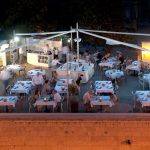So asks one of Dalmatia’s leading restaurateurs, with an interesting comparison to the Latin language.
Cuisines are like languages . . . they live, develop and die. Some die out because no one uses them anymore, so they become extinct, while some die because they stop changing, developing and as such are still in use, but not in everyday spoken use. The Latin language is the best example of a dead language. It is not extinct, it is actually taught throughout the world in primary and secondary schools, as well as in higher education. Its use and importance are paramount. French, Italian, Spanish, Portuguese and Romanian languages all derived from Latin, and the Latin language lives though them. You can’t practice law or medicine without some understanding of Latin.
The same is true with cuisines. French classical cuisine is like the Latin language. Some chefs say that it is dying out. This is meant in the sense that classical dishes from the cookbooks of Auguste Escoffier and Marie-Antoine Carême rarely find their way to the dinners in their original shape and form. French cuisine, however, develops and lives on, not thanks to the old books and old recipes, but thanks to the people, thanks to the French restaurateurs and chefs who keep on reviving it and making it adequate to the time we live in. Still, in order to become a great modern French chef one should first grasp the techniques of classical cuisines, the same as if someone learning Romance languages would find learning Latin first a great benefit.
This intro brings us more locally to our very own Dalmatian cuisine. There was recently a chef’s discussion in the local newspapers whether or not Dalmatian cuisine exists at all. One prominent chef, an executive chef in a five-star international hotel, claimed Dalmatian cuisine doesn’t exist, without much support to his claims. We were just to take him on his word. This caused another chef, owner and chef of an old Split restaurant, to come out on the offensive ,citing old recipes as proof of the existence of Dalmatian cuisine. So, the question is, does Dalmatian cuisine actually exist?
Any local cuisine is defined by local practices, cooking techniques and traditions characteristic for that particular location or area. Essential parts of any local cuisine are also all those cultural and other influences by those who passed through or settled in that particular region. Dalmatia, and cooking practices in Dalmatia were very much influenced by the conquerors and empires that ruled over it. Venetian, French, Austrian and Turkish influences are all present in local gastronomic culture, even though it needs to be recognized that these influences affected mainly the aristocracy and their cooking practices, while peasant cuisine remained mainly oriented around a few basic ingredients and simple cooking methods. In that peasant cuisine we can find the roots of much older influences, those of Slavic, Roman, Greek and very much Illyrian cooking traditions. However, the idea of this article is not to dissect local food practices and cultures and root them back to their origins, but merely to prove that if it exists, Dalmatian cuisine is not a simple, straightforward line but the kaleidoscope of influences and heritages.
If we agree that all those influences and heritages, coupled with local traditions and ingredients create something specific, something particular to Dalmatia, we can talk about Dalmatian cuisine and ultimately agree that it does exist. However, now, already into the second decade of the 21st century we need to ask not if Dalmatian cuisine exists but whether it is alive or not. Constantly citing a few old recipes and regurgitating them in a very sub-standard manner in touristy little konobas, bistros and taverns certainly does not make it alive. A few old recipes does not make a cuisine. Just as with any other cuisine, Dalmatian cuisine will live only through the chefs and restaurateurs who understand it, cherish its roots but at the same time adapt it to new culinary techniques, new dietary expectations and challenges, and most importantly, take it to new levels by accepting oncoming influences and cultures, the same way it was done again and again throughout history. This requires constant education, great passion, stronger work ethics, greater efficiency and less stubbornness, so often the stumbling block of our evolving.
So, to conclude, Dalmatian classical cuisine does exist, and it should serve as our Latin language, which chefs need to learn in order to speak their Modern Dalmatian cuisine to the guests from all over the world.
Zoran Pejovic runs Paradox Hospitality and is the co-owner of Restaurant Paradigma in Split.








